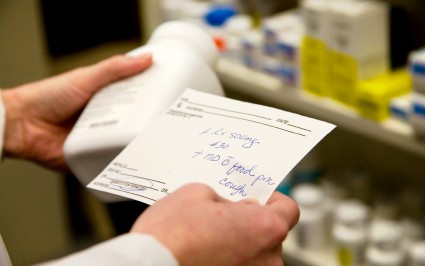
- Birth Injury Errors
- Brain Damage/Brain Injuries
- Cancer
- Dialysis Mistakes
- Eye Cases
- Gastroenterology
- Heart Disease and Attacks
- Infections and Infectious Diseases
- Internal Medicine/Primary Care
- Medication Errors
- Pulmonary and Respiratory Diseases
- Radiology/Diagnostic Testing
- Retained Instrument/Sponge Cases
- Skeletal Injuries
- Spinal Cord Injuries
- Strokes
- Surgery and Procedures
- Traumatic Injuries
- Urology
- Vascular Injuries and Diseases
Pharmacy Errors
Errors with medications are not limited to the situation where the healthcare provider, either a doctor or nurse, errorneously administers the wrong doseage or wrong medication to a patient. In fact, according to the National Association of Boards of Pharmacy, more than 7,000 deaths occur each year from incorrect prescriptions. Another 1.5 million people are made sick or injured by drug errors.
Even with stringent internal controls, a recent study published in the Internation Journal for Quality in Healthcare that pharmacists nationally make 2.2 million dispensing errors each year. This translates into an estimated 5.7 errors per 10,000 prescriptions.
According to the study, pharmacists believe that consumers who pick up their prescription medications at a drive up window may be trading off safety for convenience. The extra distractions assiciated with the drive up window service is thought to increase prescription errors.
Pharmacists attribute prescription filling errors to a number of factors:
- Unreadable prescriptions – doctors are notorious for terrible handwriting. If a pharmacist cannot reach a doctor to confirm his prescription, it leaves the pharmacist in a bad position with a waiting customer. One letter can make a difference in dispensing the correct drug and the incorrect one;
- Distractions – it is not uncommon for a pharmacist to be attending to a customer on the phone, a drive up window customer and a customer at the counter at the same time;
What You Can Do? It’s not easy for consumers to protect themselves against such errors, but there are steps you can take:
- DO NOT TRUST THEM, pharmacists urge patients to double check their work. Read the prescription your doctor gives you aloud. Ask the physician to confirm it.
- Verify the dosages and drug names with your doctor.
- Before going to the pharmacy, write down the dosage and drug names.
- Go to a reputable pharmacy, one that has more than a single pharmacist working with clerk and technician helpers. You can contact your state pharmacy board for information. Some will tell you if a pharmacist has been disciplined in the past.
- When you pick up the prescription, check the labels and make sure the dosages and drug names match what you have written down.
- Fill your prescription during off peak times
So what should you do when mistakes happen to you? The answer depends on whether you have been seriously harmed or merely inconvenienced. Consumer Affairs suggests the following action if you are the victim of a pharmacy error:
Serious harm
If you or a family member suffer grievous harm from an incorrect prescription, or if someone dies because of a pharmacy error, do not contact the pharmacy. You should never try to negotiate a settlement yourself and, just as your insurer tells you not to make any statements after a serious traffic accident, you should not communicate with the pharmacy in any way. You can only hurt your case.
Instead, collect all the evidence — any remaining medication, hospital and doctor bills, receipts, death certificates, etc. — and lock them up in a safe place, preferably a safe deposit box.
Also, take notes. Write down what happened and when, get the names of doctors, nurses, pharmacists and everyone else who played a role in the accident. Do it now, while your memory is fresh. Put the notes in the safe deposit box with the rest of the evidence.
Once you have secured all of the evidence, you must find the most accomplished and most experienced personal injury lawyer in your area. Forget everything you have heard about what a litigious society we are and how too many people are filing lawsuits.
The fact is that more than 90% of lawsuits are filed by businesses. It’s not lawsuits filed by greviously injured consumers that are clogging the courts. If you have been harmed, the legal system is the place to go for justice. That’s why it’s there.
You must find the right lawyer. Most lawyers, like most of anything else, are just so-so and most never go to trial and do not aggressively represent personal injury cases. You need to find an accomplished lawyer in your state who: a.) only represents injured consumers and b.) whose practice consists largely of trial work.
Remember that most lawyers represent corporations. You want to find the local Johnnie Cochran, the attorney who defends the little guys — because all of us are very little guys indeed when we are up against a major corporation.
Otherwise …
If you are not seriously harmed or killed, there is no reason to hire a lawyer. There is also no reason to expect the pharmacy to do much of anything about the error. Pharmacies won’t admit fault, even when no serious injury occurred.
If you believe the pharmacist should be held accountable for being negligent and putting your well-being at risk, you should file a complaint with your state pharmacy board, the entity that licenses pharmacists.
Each state’s board has an established complaint procedure. You can find a list of the state boards at the National Association of Boards of Pharmacy Web site.





